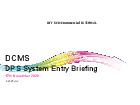Resources for communications network providers
This section provides guidance for communications network providers on legislation, regulation, working with local authorities and with property developers.
The government recognises the challenges communications network providers face in deploying digital infrastructure and has created the Barrier Busting Task Force (BBTF) to work with industry, local authorities and landowners to identify and remove barriers to deployment, including changes to the law.
This section provides guidance for providers on working collaboratively with local authorities, land owners, and property developers, and adopting best practice within the current legal framework.
Working with local authorities
This section contains practical advice for working with local authorities, including identifying a single point of contact, early engagement, and opportunities to communicate the benefits of enhanced connectivity.
Working with property developers
Network providers and developers need to work together, share information early and establish best practice principles to deliver high quality connectivity consumers need. Early engagement, coordinated planning and good communication can enable smoother deployment.
Legislation and regulation
Operators are encouraged to understand how the new Electronic Communications Code (the ‘Code’) affects their deployment; and to take note of the guidance and code of practice developed by Ofcom.
- Digital Connectivity Portal guidance on the Code
- Ofcom guidance on the Code
- UK Subsidy Information Page
Deployment
Operators are encouraged to cooperate with local authorities and developers in accordance with best practices around access agreements and street works.
- Access to public sector assets
- Guidance on access agreements
- Digital Infrastructure Toolkit
- Street Works Toolkit
Climate and Sustainability
BDUK has prepared an environmental resource guide to support the rollout of digital infrastructure in England. This aims to provide greater awareness of climate adaptation, environmental improvements (biodiversity gains), and low carbon considerations. The guide has direct relevance across the UK, and can help in delivering BDUK funded projects, as well as commercial rollout. We encourage regular use of this, and regular checks of the latest environmental provisions in your local area.
This guide also complements the collaborative action by large connectivity providers and Digital Connectivity Forum in July 2023, to reduce supply chain carbon emissions.
Project Gigabit
Executive summary
BDUK is undertaking a series of activities seeking information from operators of wholesale broadband networks and supply chain partners regarding the proposed procurement approach for delivering gigabit capable broadband to the UK.
About Project Gigabit
The government wants to deliver nationwide coverage of gigabit-capable broadband as soon as possible and is confident that the private sector will deliver gigabit connectivity to the most commercial 80% of the country by 2025. We are backing Project Gigabit with £5 billion so hard to reach communities are not left out of this revolution in connectivity.
The proposed approach builds on lessons learnt from the Superfast programme and includes a number of measures to maximise competition, promote open access networks, and encourage long term competition and value for money on the network.
Technical consultation
During December 2020 and January 2021, we asked for views from network providers and local authorities to help us target delivery of the UK Gigabit Programme, which includes demand-led approaches such as Gigabit Broadband Vouchers and the new “outside in” supply-side interventions.
The Planning for Gigabit document was a technical consultation to gather the views of broadband delivery leads in local authorities and telecoms providers interested in bidding for subsidy to deliver gigabit capability throughout the UK. The feedback we received has helped us to refine our programme to maximise coverage in the harder to reach 20% of the UK by 2025.
We also ran a series of market engagement events with network providers during 2020 and 2021.





